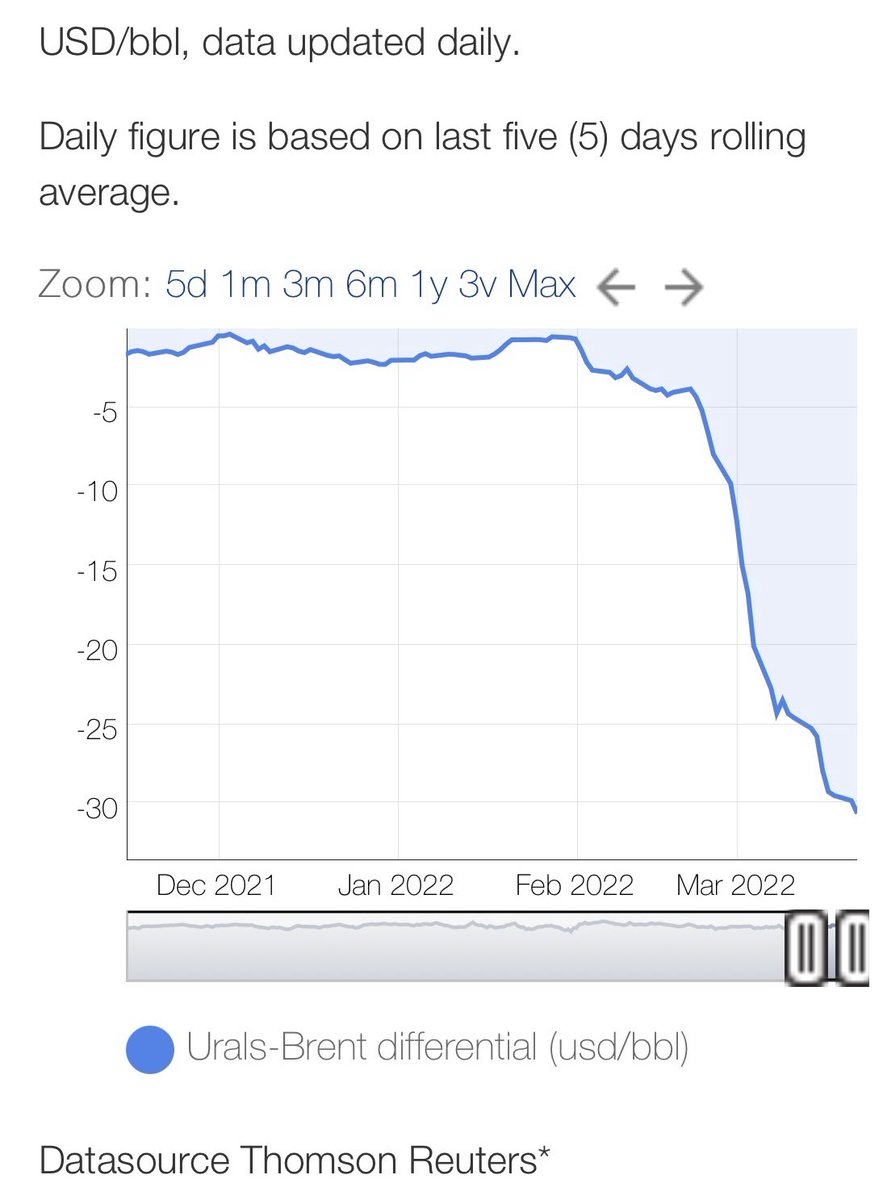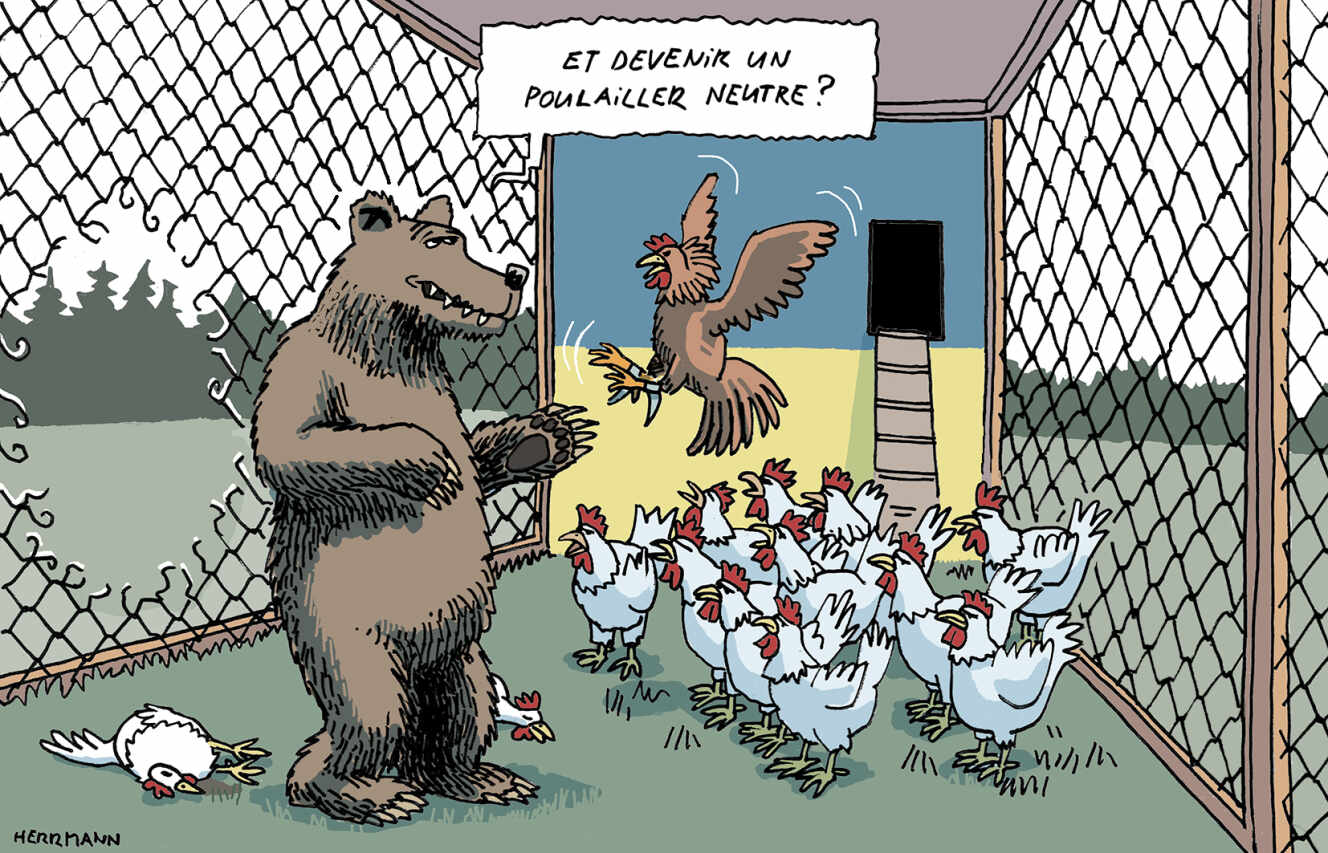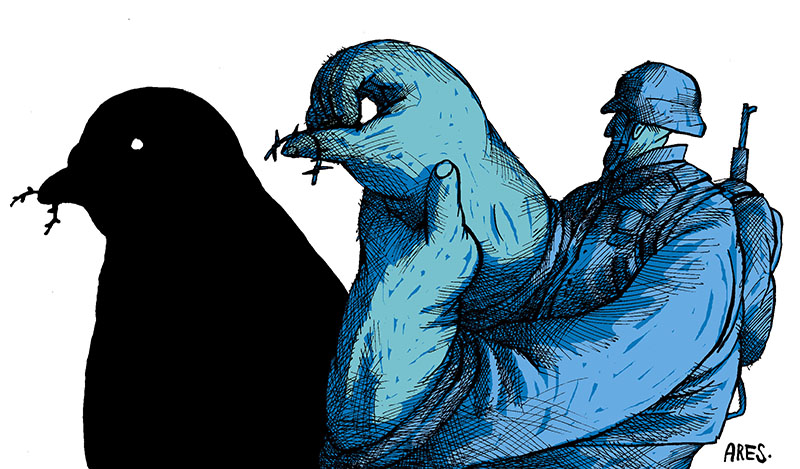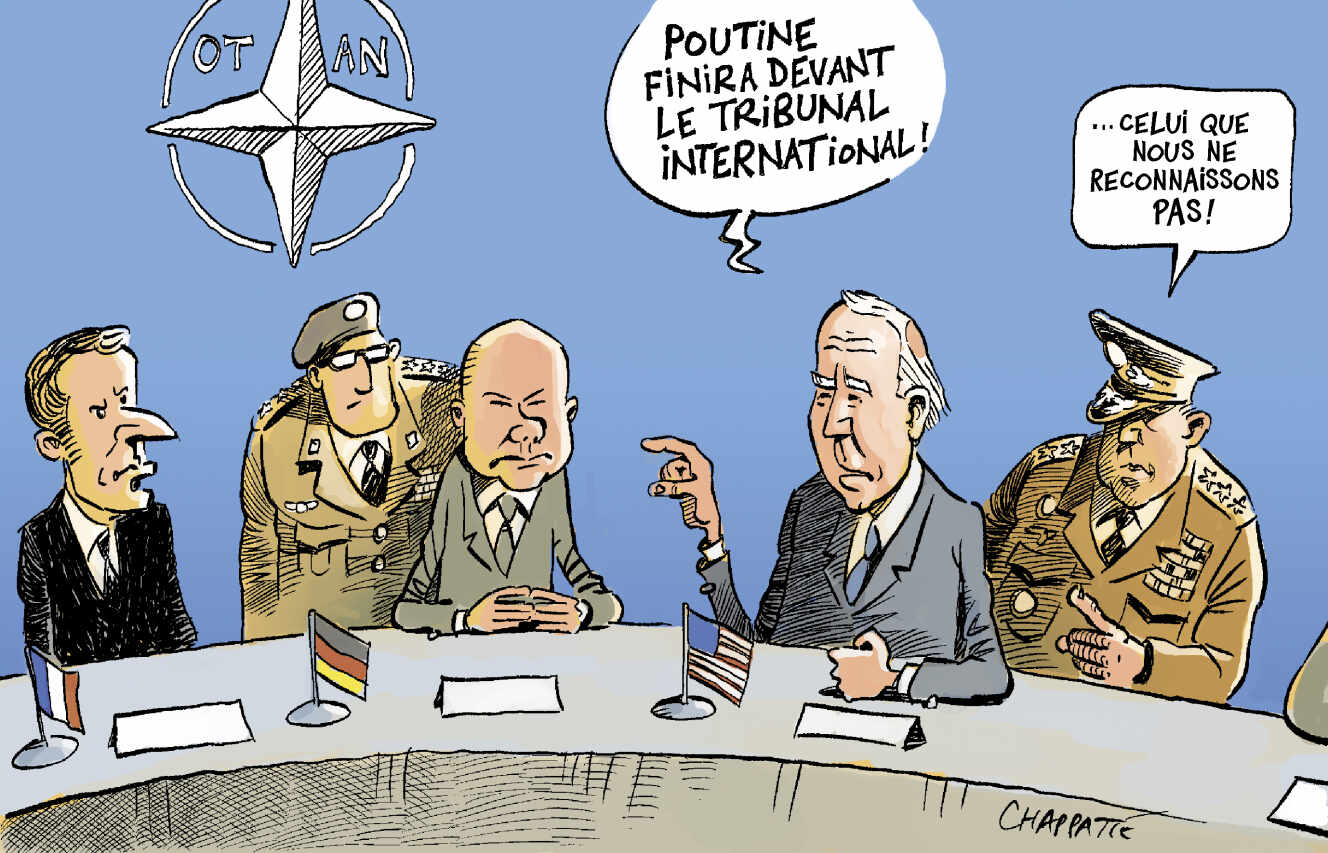-
 FreeEmotion
774But what about Will Smith slapping Chris Rock?! — Benkei
FreeEmotion
774But what about Will Smith slapping Chris Rock?! — Benkei
I was hoping no-one would bring that up, but since you did:
I suggest that the whole thing was staged to send the message that an unprovoked aggression by host Chris Rock (representing Putin) even verbally, of an innocent woman (representing Ukraine) will not be tolerated and will be met by a 'strike' by Will Smith (representing NATO).
Far- fetched? Well consider this: Chris Rocks initials "CR" match with the first two letters of "Crimea", and the military reference to "GI Jane"?
Now all we need is for the White House to come out and say Will did not mean to slap Chris. -
 ssu
9.8k
ssu
9.8k
The Urals price is something like 30 dollars cheaper to the Brent price. But of course Putin announcing that the payments have to be paid in rubles is a breach of contract. But anyway, a lot of breached contracts in a war.So you have to pay in rubles, based on a price that looks ok today but which could absolutely suck in 3 or 6 months time due to changes in the exchange rate. — Benkei

Do note that this wasn't taken off from SWIFT.How are you going to pay for it when they're no longer on SWIFT? — Benkei
All this will just quicken the change out of Russia oil and gas for Europe.
The really annoying thing is that this will likely increase coal production, because of course nuclear cannot be an option.
But Biden's policies are even more confusing:
Biden administration officials traveled to Venezuela over the weekend for talks on potentially allowing the country to sell its oil on the international market, helping to replace Russian fuel. Biden may travel to Saudi Arabia as the US works to convince the kingdom to increase its production. And a looming nuclear deal could bring significant volumes of Iranian oil back to the market.
Caracas, Riyadh and Tehran would have been unlikely sources of relief for a Biden-led Western alliance before the start of the war in Ukraine. But Russia's invasion has upended international relations, forcing the US and other nations to seek out solutions in places they'd previously shunned.
So in order to put sanctions on one country, other sanctions on other countries are lifted? Yet this point is absolutely crucial for Biden because the higher gas prices will be in the US, the lower his approval rating will be. Already there is inflation (thanks to the insane monetary policies), and this will make it worse.
Of course the logical question here is, why not rely on Canada? Well, here the reasons are obvious result from past decisions. A Canadian commentator sums it up why Canadian oil/gas isn't the logical solution (as it could be):
Experts seem to agree that our (Canadian) contribution will be marginal at best, because our energy industry has been starved of investment for years. All because governments have scared away investors by consistently blocking proposed pipelines and LNG export terminals, which could now be supplying our allies in the U.S., Asia and Europe with oil and gas from a democratic country that abides by the rule of law, has strong environmental standards and has no imperial or genocidal ambitions.
The tragedy is that if governments — including the Biden administration, which nixed the Keystone XL pipeline on Day 1 — had simply gotten out of the way and allowed decisions over pipelines and other infrastructure projects to be made by private businesses and landowners, including First Nations, Canada would have a much greater ability to produce and export its natural resources, at little to no cost to the treasury.
In Europe now those LNG export/import terminals and everything else have to be built on a crash course and likely with more cost now. But they will be built and perhaps in a year or some time the West won't need Russia's hydrocarbons.
(note the country that has anticipated that Russian gas might be a problem and not only planning but already constructing more LNG terminals: )

-
 Benkei
8.1kI'm talking about the derivative contracts to hedge your exchange rate risk. Those aren't currently exempted from what I understood because that's a regular financial contract between financial institutions and not commodity energy trading.
Benkei
8.1kI'm talking about the derivative contracts to hedge your exchange rate risk. Those aren't currently exempted from what I understood because that's a regular financial contract between financial institutions and not commodity energy trading.
I don't know how much Norway can up its production but the Netherlands has a large reserve of gas we stopped pumping because it caused earthquakes and damage to buildings in Northern Netherlands. If prices go up enough or Putin switches if the gas, at least gas for heating won't be an issue. Electricity though... -
 ssu
9.8k
ssu
9.8k
Depending on the price, Russia has gotten about half or one third of it's governments revenues from hydrocarbons. As stated even in this thread, the real sanctions that matter is the gas/oil trade with Russia.If prices go up enough or Putin switches if the gas, at least gas for heating won't be an issue. Electricity though... — Benkei
Yet Russia is at war and however they claim the "tactical truth" of talking about special military operation, they now they are in a large war. Putin and his regime knows that. Hence that there is a severe economic depression doesn't actually matter. The it's estimated that the Russian GDP will fall 10% this year and Russia's economy will shrink to what it was a decade ago doesn't matter. For Putin it's nearly irrelevant: unlike in the case of Biden, there aren't any angry voters ready to vote for the opposition because the prices are so high.
In the European context basically the issue is about the existence of true political leadership of the lack of it. More closer you go towards Ukraine, the more likely it is that people would accept higher gas prices as costs of opposing Russia. The worst case is that politicians deny there's going to be any effect ...and then the country hits a crisis.
The worst possible option is for decision makers to put their heads into sand and pretend that alternative energy / renewable resources will save the day. They might do that, in a decade or two, but not now as we are going to face an immediate supply problem. And thus their actual decision (the one they don't publicly announce) will be to dig up more coal. And then in a year or so we notice that coal production has gone up and the promises of carbon neutrality (or coal phase out) aren't going to be met at all. -
 ssu
9.8k
ssu
9.8k
Well, notice how this casino has worked: from negative prices to the present.I'm talking about the derivative contracts to hedge your exchange rate risk. Those aren't currently exempted from what I understood because that's a regular financial contract between financial institutions and not commodity energy trading. — Benkei -
 boethius
2.7kWhat should be noted that the dismal performance in the start of this invasion is mainly due to the poor assumptions that Ukrainians wouldn't fight, which was an intelligence failure. — ssu
boethius
2.7kWhat should be noted that the dismal performance in the start of this invasion is mainly due to the poor assumptions that Ukrainians wouldn't fight, which was an intelligence failure. — ssu
Although this could be accurate, again I feel the need to debate it.
Agreed, total capitulation is what Putin, Kremlin and the Russia military would prefer (who wouldn't).
However, if you look at events on the ground, they go uncontested from Crimea, basically the first day to take Kherson and first couple days to link up with their forces in the East. These were insanely quick manoeuvres, and achieved 2 critical strategic objectives of taking a position South-West of the Dnieper, thus requiring Ukrainians to commit a large amount of troops to guarding a long defensive line to avoid Ukraine being cut North-South ... instead of a small amount of troops if they just blew-up all the bridges or defended Kherson with urban combat resulting in a prolonged siege.
From a military perspective, these are super critical strategic objectives and achieved incredibly quickly.
You have to compare this to the "risk" situation where Ukraine blows up the bridges out of Crimea and pin down Russian forces there and then Ukrainians Eastern front is far easier to hold, Mariupol (symbol of Azov battalion, of which the destruction is a stated justification for the war, and capturing Azov guys with swastika tattoo may not play get attention in the West, but maybe a different story in Russia).
Certainly, the "best case scenario" didn't happen for the Russians, and losses have been heavy (maybe far heavier than they anticipated), but they have largely achieved what they said they set out to achieve.
It is reasonable to assume that they focused on what was most critical in planning, and likely had setup before hand capitulation of border guards, cities and so on.
Not only military objectives, but the immediate cutoff and siege of Mariupol is a critical political objective, as traps Azov brigade which simply has plenty of members with Nazi tattoos ... so capturing a bunch and prosecuting them (non-regular forces, so not not really POW's and have zero POW rights) is an immense political win. Already, there's an American journalist that has reported a woman found with a Swastika painted in blood on her stomach ... and these guys are fucking nuts, it's completely in their MO and parading captured Nazi's (from the Russian perspective) makes people's blood boil.
Now, if the Russians know they can't occupy all of Ukraine ... maybe they planned to take first day what they actually do want and can hold long term (land bridge to Crimea) ... and so maybe the other front were just to tie up Ukrainian troops in the event of large scale resistance as Russia now claims.
As for reports of "house arrest" of the intelligence chief in Russia and disappearance of department of defence ... this could easily be to play for the home audience. Obviously there have been mistakes and high costs (I'm definitely no minimising the costs, just pointing out military objectives have been achieved with those costs).
Even if they they though heavy Ukrainian resistance likely - indeed, even if they actually wanted a soft invasion, a few "failures", and bait Ukraine into total war, so reasonable offers are rejected and they can completely decimate the Ukrainian military infrastructure and economy ("help" from the West will stop the moment news cycle switches ... and it's mostly debt anyways) - Putin maybe simply upset about embarrassing losses and equipment failures and corruption coming to light (all of which is very real), and also needing to send a "signal" to the population that people "answer for mistakes".
We don't know what's actually true in the fog of war and what are viewed by the Russian military as acceptable losses to achieve objectives, what is a tactical retreat or then a rout, or what are in fact ATGM decoys or even purposefully staging losses to bait enemy counter offensives to keep them far in the East or whatever (i.e. what), and what is just straight up embarrassing failure (which is going to happen in a large scale conventional war; plenty of allied commanders had embarrassing failures in WWII).
To take one example, there's a photo of a Russian tank with egg cartons spilling from the most recent reactive tank armor. Now, such a photo could be staged for propaganda footage ... or maybe just one of the failure modes of the armor and exactly what an engineer who worked on the system would expect to see, as there's a layer of cardboard like wrapping. We don't know. However, Russian military and Putin would know, and let's assume it is just straight-up corruption of filling reactive armor with egg cartons to pocket the cash or hit quotas. Even if the war is going well: soldiers, commanders and Putin are going to be pissed about that and want people to answer for it.
Point being, we don't even really know what the facts even are -- FSB director being under house arrest could be FSB directors idea as just a good propaganda technique to signal the Russian population that "something is being done" to hold people to account for "accidentally" starting a total war with Ukraine which was the FSB directors idea to do in the first place -- and, even if we did know the facts, we don't know what narrative they fit. "Discipline" for mistakes, even if everything is going to plan overall, is still completely normal in a huge institution (only the US promotes people for disastrously starting a war on made-up pretences), and mistakes of all kinds are to be expected in a massively chaotic total war situation.
To evaluate "if things are going well or badly" or costs have been "too high", we need to know what the statistics on the ground are, actually be able to compare Russian losses to Ukrainian losses, and we'd actually need to know what Russian leadership is trying to achieve exactly (which we don't). -
 boethius
2.7kAlready there is inflation (thanks to the insane monetary policies), and this will make it worse. — ssu
boethius
2.7kAlready there is inflation (thanks to the insane monetary policies), and this will make it worse. — ssu
... I seem to remember discussing inflation and it's impact on the global system a couple of years ago.
Literally 2 years ago, 17, 03, 2020:
Now that the important philosophical subject of how trades are executed on stock exchanges has been investigated, I propose we move onto the general topic of corona virus and the stock market.
My understanding of the situation is as follows:
1. Corona is causing massive disruptions to most sectors of the economy: collapse of air travel and tourism for an unknown time, closing of local restaurant and entertainment and every other "in person" businesses for an extended period, many old people dying which will put more homes on the market, disruptions to supply chains due to manufacturing shutdowns in China, and long term psychological based changes in behaviour, damage to health systems (mainly skills dying or being so traumatized that they quit during or afterwards), and all related supply industries.
2. The positions taken by central banks to paper-over the 2009 "great recession" have not been unwound.
3. There are no more tools available (nor the prospect of until now "unthought of" tools) that can encourage traders to believe the free market will be stabilized by collectivists schemes of one form or another.
4. Therefore, any market actions by regulators of central banks will simply encourage people in the know to use those actions to get out even faster (not anticipate those actions will actually work and therefore stay in).
5. Large businesses will be bailed out anyways, even if long term structural changes to the economy mean there are no viable paths back to profitability.
6. Large sectors of the US economy, such as the fracking industry, have essentially never turned a profit and are faced with an economic down turn and a Russia and Saudi price reduction to force them into bankruptcy. Bailing the fracking industry out cannot even be imagined to make sense; they may actually be left hanging due to problems elsewhere being simply too great for friends to look after each other. (but this is an analytic side-quest to maximize one's schadenfreude at the expense of fracking executives and investors, and yes, a little bit at the expense of fracking workers too; but of course, doesn't help the financial system to have a giant rotten lemon on their desks as no one drinks rotten lemonade, except the fed of course)
7. Therefore, the central banks and regulators, by monetizing one way or another, trillions in losses will cash-up the investor class and be left holding what is technically referred to as "a big bag of dog shit".
8. This cash reentering the market when things are stabilized will cause massive inflation of whatever good assets remain.
9. There are no policy tools left (I am of aware of anyways) that could counter-act this inflation (US is already in trillion dollar deficit, 1.5 trillion "plausible deniability bailout" is already started in first week of this crisis and there will be much more, interest rates are zero or negative, the deficit will go even higher, and the fed will stop reporting on their financial alchemy projects).
10. We can reasonably conclude that inflation therefore will not be controlled (i.e. controlled less than the current policy mechanisms as well as just changing the definition of "what people need" on the fly).
11. International trade will start to collapse back to "real assets" (do you have something tangible I want, do I have something tangible that you want), rather than the previous regime of debt based trade (well, debts haven't been a problem before, therefore I will continue to pretend they will never be a problem in the future).
12. Referring back to tangible assets will be a radical simplification of the current trade system (not clear if there will be markets for most of the crap currently produced).
13. Regulators will realize at this point that there is no way to reboot the system without even more inflation since they just gave most of the money to the wealthy ... and have been doing so for the last decade already (and trickle down theories obviously make no sense, so the money will sit there but ready to pounce on any assets that do start to go up in price if the governments do try to bailout the poor through small "throw them a bone" inadequate measures, as horrifying as that sounds they will be forced to face their deepest fears of needing to throw those bones).
14. Service economies will collapse as credit dries up. Manufacturing will radically simplify, but countries with modest manufacturing capacity will be forced to protect their manufacturing due to over-capacity of larger manufacturing centers trying to shift production to "anything and everything that is still being bought somewhere"; the interdependence of manufacturing economies will make such policy shifts acrimonious and volatile.
15. Bottom line: isolationism as we saw in the great depression is now unavoidable, with all tools in the policy shed hemmed in and blunted by inflation.
16. World War would be great to just nationalize whole manufacturing bases and get people jobs in the business of killing people and use the nationalist furor to crush socialist agitation that's trying to help the poor, but nuclear weapons render this no longer "the go to" easy solution for capitalism's woes. It will still be tried, of course, using conflicts to get people focused on something else, but with unknown efficacy / survival of the human species. — boethius
Policy makers in the West have gone off script a tad bit here and there, but more or less just followed my advice these past 2 years, and definitely had the end point clearly in focus (strategy is very much an eye on the prize kind of undertaking, as I've previously mentioned).
And they didn't even pay me for it!
That's just how generous of a person I am.
They did largely prop-up the fracking industry, but frackers downsized rig counts and imposed austerity on themselves. And we're all now happy they did prop up the frackers, to be able to sell far more expensive gas to Europe now that there's the predictable "brink of WWIII" and new cold war, to depress Europe's economy over the long term and remove them as a significant player on the world stage.
Already EU leaders are so weak with nearly all their previous influence removed, that Biden can just speak on their behalf; CIA doesn't even need to tell them what to say anymore. -
 boethius
2.7kThat was already a failure to start with: no clear goals, so you have soldiers asked to sacrifice their lives for... well... everything and nothing. — Olivier5
boethius
2.7kThat was already a failure to start with: no clear goals, so you have soldiers asked to sacrifice their lives for... well... everything and nothing. — Olivier5
We don't know what they think.
They may know what they think and have very clear goals.
To achieve their goals, using warfare, may include deception to keep us guessing about what they are trying to do (so that our actions are counter productive).
If the Kremlin actually wants a Schism in the West, and all Western actions have so far simply consolidated the Kremlin's power within Russia as well as the international system, then ... our policies are helping the Kremlin achieve its goals, not dissuading them nor punishing them. -
 Olivier5
6.2kWe don't know what they think. — boethius
Olivier5
6.2kWe don't know what they think. — boethius
They are in damage control mode right now, saying they didn't really care for Kiev now that they have been repelled from there, and after having sacrificed thousands of lives to try and get there... :smirk:
My point was that soldiers in a high intensity war need motivation, and not everybody can be suitably motivated just by killing innocent people randomly. Only few peoples are psychopathic murderers. The others, the regular average soldier would want to know what he is asked to fight and die for. Otherwise he's just going to try and save his own skin. So not articulating clear war goals is part of this big failure we are seeing. -
 boethius
2.7kThey are in damage control mode right now, saying they didn't really cared for Kiev now that they have been repelled from there, and after having sacrificed thousands of lives to try and get there... :smirk: — Olivier5
boethius
2.7kThey are in damage control mode right now, saying they didn't really cared for Kiev now that they have been repelled from there, and after having sacrificed thousands of lives to try and get there... :smirk: — Olivier5
Again, every single Western analyst, generals and academics alike, told us the Russians have not amassed a force large enough to occupy and passify all of Ukraine and that Urban combat will be a massive cost to the Russian military.
At the time, both I and @Isaac, pointed out that maybe Russia knows that and their strategy is therefore not to occupy all of Ukraine, but just blowup a significant part of their military and take a land bridge to Crimea.
Also, Russia knows about the fanatical neo-Nazis and that the CIA has been training and equipping fanatical forces just as in Syria, why would the playbook change (which, however many they are, for sure will fight an insurrection) ... so, again, maybe they therefore never intended to occupy the entire country.
If Russia simply never intended to engage in intense Urban combat to take Kiev, then just going right up to Kiev and stopping there is a good strategy: keeps focus and resources on the capital and also has immense psychological affect on leadership.
Now, would they have rather Ukraine just capitulate? Obviously. But considering they only committed less than half their forces in the initial invasion ... it's reasonable to conclude that they had a plan B of "warfare" if the less-than-half force didn't provoke complete capitulation after starting a full scale invasion. -
 Olivier5
6.2kNothing looks reasonable here, on the Russian side. It's all about war crimes, power trips, incompetence, and keeping a zombified political system alive. You are looking way too hard for rationality where it may not exist.
Olivier5
6.2kNothing looks reasonable here, on the Russian side. It's all about war crimes, power trips, incompetence, and keeping a zombified political system alive. You are looking way too hard for rationality where it may not exist.
The reason they can't articulate a war goal may simply be that they don't know what they are trying to do. Not clearly. Not as a team. For all we know they just tried to do what the US did in Iraq, and failed miserably. -
 boethius
2.7kNothing looks reasonable here, on the Russian side. It's all about war crimes, power trips, incompetence, and keeping a zombified political system alive. You are looking way too hard for rationality where it may not exist. — Olivier5
boethius
2.7kNothing looks reasonable here, on the Russian side. It's all about war crimes, power trips, incompetence, and keeping a zombified political system alive. You are looking way too hard for rationality where it may not exist. — Olivier5
If you bother to go and understand anything about geopolitics before weighing in on a geo-political issue, then you may start to see there could be reasons for the actions of powerful institutions. Doesn't mean there aren't risks, but proving someone, much less an entire institution, is "irrational" is a large hurdle and can only be proven by disproving all rational models that could resolve apparent contradictions, not only in what someone or some institution says, but more importantly in their genuine belief (which they may not report accurately for our analytical convenience).
Only the West (basically US, EU, Australia and Canada) have imposed sanctions on Russia. Obviously China hasn't, but neither India.
The geopolitical outcome of this war is cleaving off the developing world from the western dominated system.
Only Westerners view this war as "the small, brave and intrepid Ukraine under their own steam, fighting off the haughty Russian Army".
Everyone else views this war as Russia against the West, against NATO.
A large part of the rest of the world perceives the West as the bully, and Russia is now making a stand against that bully.
It's a risk, but if Russia survives politically and economically, Putin remains in power and Russia reorients its economy and just sells its resources to China and India and other developing nations. What's going to happen?
Total collapse of the US as a super power.
US is not a military empire, it is a financial empire. US military roll in the American Empire is that it's strong enough to topple nearly any medium sized government at will. Libya talks of an African bank and gold backed African monetary policy: Libya is now a failed state.
However, this is a wack-a-mole endeavour. If Africans did just come together to shirk off neo-colonialism, then the US cannot actually go and conquer all of Africa.
So, what is Russia doing really?
It's demonstrating the US financial, covert and military threats can be beaten. It's proving to the non-Western world that there's a economic and political system that now exists that the US can't just topple over into a failed state at will.
For all governments of the world that do not perceive themselves as benefiting from the Western system, but paying tribute instead, Russia is currently demonstrating an alternative.
For example, what does China actually get with its trade with the US? It gets US treasury bills.
There is simply a logical limit to how many US treasury bills China could possibly want.
Maybe China has simply had its fill of T-bills and now wants something else, real wealth, in exchange for what it offers. Russia is making that world come true.
What people fail to take into consideration is that the ex-Soviet intelligence types may have learned something from the collapse of the Soviet Union, and see the US as having the same weaknesses: too much internal dissatisfaction, too much debt, too much propaganda, and old decrepit elites that can't adapt.
Can we really say Russia is more corrupt when it used it's wealth to build up hundreds of billions of Euro and USD and tons of gold in reserve (public wealth) ... while the West transfers trillions of USD and Euros to the investor class as no-strings-attached "payment" for crashing the financial system due to "regulatory capture". Reward for destroying the credibility and stability of financial system upon which the West's power rested ... and crony capitalism writ large, banking and mega-corporation bailouts, is the direct cause of the current inflation and Wests' weakness?
The US imposed "collectivist" lockdowns for the "common good" ... and then evicted people from their homes on an industrial scale. That's really less corrupt? -
 Olivier5
6.2kThe problem in your picture there, is that the bear can do and say what it wants in that scenario. — boethius
Olivier5
6.2kThe problem in your picture there, is that the bear can do and say what it wants in that scenario. — boethius
Why is that a problem for you? I thought you liked bears more than hens.
Edit: I think I understand now what you meant: that as a piece of western propaganda, this cartoon was problematic, because it shows Russia (the bear) in a dominant position, or as you phrased it, able to do whatever it wants.
That may be because the cartoon is not a propaganda piece produced for your average Anglo-Saxon capitalist sheep media. It was instead produced as part of the Cartooning for Peace project, a non profit open to a wide array of professional and amateur cartoonists. Le Monde is publishing one a day.
https://www.cartooningforpeace.org/ -
 Isaac
10.3kI'm not trying to prove anything. You are. You are peddling the message that they know what they are doing. I just think they don't. — Olivier5
Isaac
10.3kI'm not trying to prove anything. You are. You are peddling the message that they know what they are doing. I just think they don't. — Olivier5
So @boethius is 'peddling' a message, but you're just offering an opinion? Care to share with us what the difference is?
They may not sound like it in your head, but I assure you your posts are coming out sounding just as self-assured and dogmatic as anyone else's. You're not some 'voice of moderate disinterest' in a sea of rampant ideology, you've been absolute hard-line apologist for the mainstream Western narrative throughout, and no less fundamentalist about it than the rest of us. -
 boethius
2.7k
boethius
2.7k
Someone who is able to say:
14. Service economies will collapse as credit dries up. Manufacturing will radically simplify, but countries with modest manufacturing capacity will be forced to protect their manufacturing due to over-capacity of larger manufacturing centers trying to shift production to "anything and everything that is still being bought somewhere"; the interdependence of manufacturing economies will make such policy shifts acrimonious and volatile.
15. Bottom line: isolationism as we saw in the great depression is now unavoidable, with all tools in the policy shed hemmed in and blunted by inflation.
16. World War would be great to just nationalize whole manufacturing bases and get people jobs in the business of killing people and use the nationalist furor to crush socialist agitation that's trying to help the poor, but nuclear weapons render this no longer "the go to" easy solution for capitalism's woes. It will still be tried, of course, using conflicts to get people focused on something else, but with unknown efficacy / survival of the human species. — boethius
Connected to a wider body of analysis.
Two years ago—before massive bailouts, bone throwing, and the predicted inflation when bailout money "returns"—before any of that even happened.
Does not have "opinions".
Such a person literally sees into the future. -
 FreeEmotion
774It's a risk, but if Russia survives politically and economically, Putin remains in power and Russia reorients its economy and just sells its resources to China and India and other developing nations. What's going to happen?
FreeEmotion
774It's a risk, but if Russia survives politically and economically, Putin remains in power and Russia reorients its economy and just sells its resources to China and India and other developing nations. What's going to happen?
Total collapse of the US as a super power. — boethius
This looks like a plan, but it is very risk, and very aggressive. Risky for Russia and for the world.
Nice cartoons. At least they are discussing the possibilities.
Time to negotiate or fight to the last chicken.
Welcome to The Philosophy Forum!
Get involved in philosophical discussions about knowledge, truth, language, consciousness, science, politics, religion, logic and mathematics, art, history, and lots more. No ads, no clutter, and very little agreement — just fascinating conversations.
Categories
- Guest category
- Phil. Writing Challenge - June 2025
- The Lounge
- General Philosophy
- Metaphysics & Epistemology
- Philosophy of Mind
- Ethics
- Political Philosophy
- Philosophy of Art
- Logic & Philosophy of Mathematics
- Philosophy of Religion
- Philosophy of Science
- Philosophy of Language
- Interesting Stuff
- Politics and Current Affairs
- Humanities and Social Sciences
- Science and Technology
- Non-English Discussion
- German Discussion
- Spanish Discussion
- Learning Centre
- Resources
- Books and Papers
- Reading groups
- Questions
- Guest Speakers
- David Pearce
- Massimo Pigliucci
- Debates
- Debate Proposals
- Debate Discussion
- Feedback
- Article submissions
- About TPF
- Help
More Discussions
- Other sites we like
- Social media
- Terms of Service
- Sign In
- Created with PlushForums
- © 2026 The Philosophy Forum










